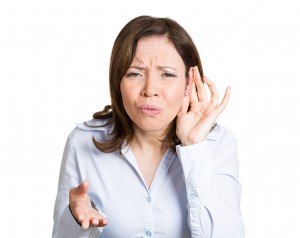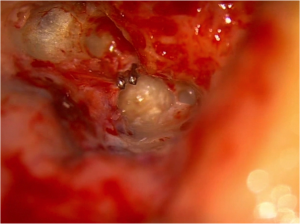Meniere’s disease
It is suspected with the association of:
- Rotatory vertigo
- Hearing Loss
- Tinnitus
- Ear fullness
Cochlear symptoms (hearing loss, tinnitus and fullness) must be in the same ear. In 30% of cases, Meniere’s disease is bilateral.
This is a vestibulo-cochlear hydrops; ie an increase of the endolymph pressure (fluid in the inner ear) in the labyrinthe. This hydrops generates distension of the inner ear compartments while causing hearing loss, vertigo, fullness and tinnitus.

Vertigo remains at least 20 minutes and in some cases persists up to 4-5 hours without stopping. It is very strong and very debilitating. It is usually followed by a major weakness. Patients are too tired and often forced to sleep several hours.
Meniere’s disease is a recurrent disease; ie the patient can do several attacks per year. In severe cases, attacks may be more common: 1 to 2 times a week. Between attacks, patients are asymptomatic (no dizziness or imbalance). The greater the number of repetitive crisis is, the hearing loss becomes permanent.
Evolution is paroxysmal with a frequency and intensity of attacks variables from patient to another and even for the same patient. After several years of evolution, vertigo attacks fade and deafness worsens. Therefore, we can talk about “aged Meniere”.
The information reported by the patient to the ENT are paramount; The ENT needs to know the duration of rotary vertigo and their associated symptoms as well.
The audiogram confirmed the sensorineural hearing loss. Sometimes hearing loss is a mixed type, especially on low frequencies.
The VNG shows a unilateral vestibular deficit on the side of the hearing loss. Sometimes it is normal at the beginning of the disease.
Treatment involves several stages:
1- A prevention from the products that can increase water retention in the labyrinth like Caffeine (C), the alcohol (A), Tea (T) and Salt (S); hence the mnemonic: CATS.
2- Medications: Acetazolamide, Hydrochlorothiazide and Betahistidine.
3- In case of prevention and medical treatment failure, surgical treatment can be offered. Dr Saliba made different researches on Meniere’s disease and has developed a new surgical treatment that has given in 96% of patients undergoing this treatment a total cessation of Meniere’s attacks. This group of patients had refractory Meniere to medical treatment combined to CATS prevention. The average number of attacks in these patients was 8 attacks per month. Dr Saliba published in January 2015 on this new surgical treatment, where the hearing and vestibular function can be preserved. It is the endolymphatic canal blockage. There is no destruction of the labyrinth or hearing.

Migraine is more common in patients with Meniere’s disease than in a control population. Patients suffering from both Meniere’s disease and vestibular migraine have been repeatedly reported. A fluctuating hearing loss, tinnitus and ear fullness, can occur in vestibular migraine, but deafness is not evolving towards a profound hearing loss. Likewise, migraine headache, photophobia and even migraine with aura, are common in Meniere’s disease crisis. When symptoms meet the criteria for Meniere’s disease, particularly when the audiometry confirm the hearing loss, the diagnosis of Meniere’s disease should be retained, although migraine symptoms occur during the vertigo attacks. Only patients who suffer from two different types of vertigo, corresponding on one hand to the requirements of vestibular migraine and, on the other hand, to those of Meniere’s disease, can be diagnosed with the two diseases.
_____________________________________
Anatomy and Function of the labyrinthe
Definition
Do you have vertigo? An imbalance?
Benin Paroxysmal Positional Vertigo (BPPV)
Meniere’s disease
Neuronitis or vestibular neuritis
Labyrinthitis
Dehiscence of the superior canal
Cervical dizziness
Perilymphatic fistula
Migraine and vertigo / Vestibular Migraine
Basilar migraine and vertigo
Vertigo of central origin
Psychogenic vertigo
Vertebrobasilar insufficiency and imbalance
